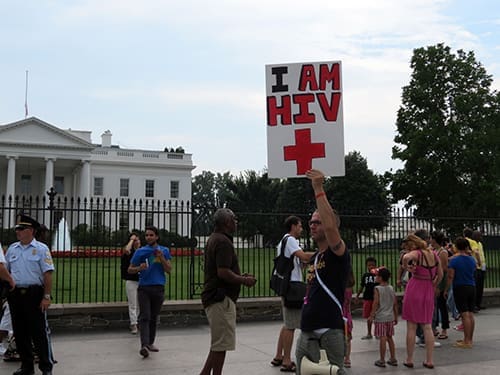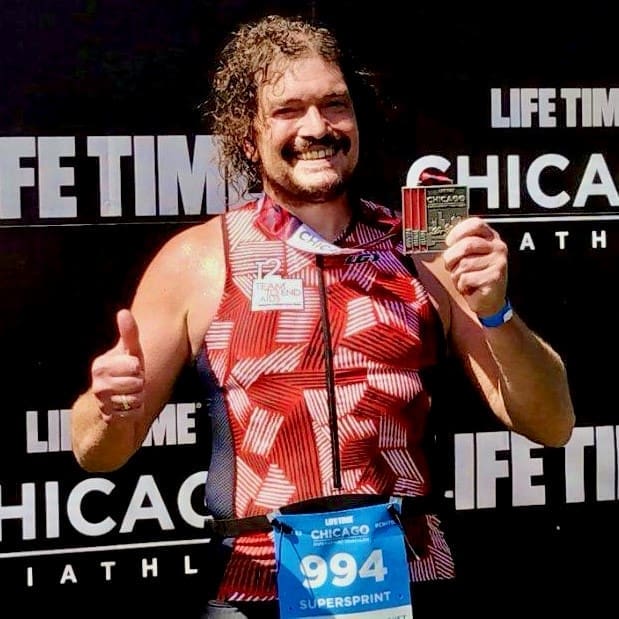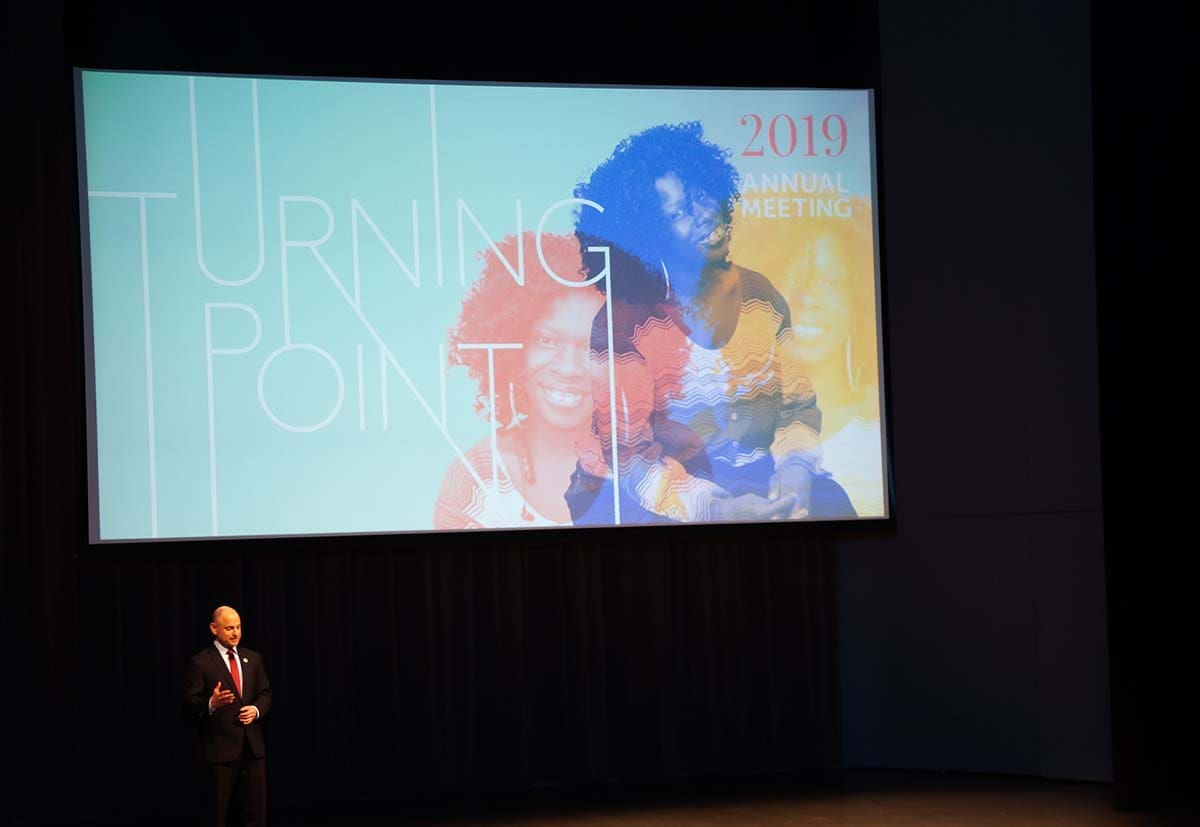
Tens of thousands of people descended upon Washington, D.C. for the International AIDS Conference (AIDS 2012) during the week of July 22-27.
They represented all races, gender identities, continents and walks of life. They were scientists, researchers, diplomats, activists, journalists – and people living with HIV/AIDS. It was truly an incredible global gathering focused on “turning the tide” of the AIDS epidemic.
The AIDS Foundation of Chicago (AFC) was everywhere at the conference. Thanks largely to scholarships and sponsorship, about a dozen staff attended and were active on various fronts, including harm reduction/social justice, rectal microbicide and lube access advocacy, policy leadership, and female condom use – just to name a few.
Special thanks go to the Levi Strauss Foundation, Broadway Cares/Equity Fights AIDS, Bristol-Myers Squibb (BMS), AIDS United, MAC AIDS Fund, and other foundation and individual donors for generously supporting AFC’s involvement in the conference. Extended coverage of the conference is posted at www.aidschicago.org/aids2012.
Here’s a recap of AFC’s presence at the AIDS 2012 conference:
AFC Leadership
Before the conference even began, AFC was featured in “Turning the Tide Together,” a film created by the Levi Strauss Foundation that premiered before the opening session. The film can be viewed here.
And then the conference officially commenced with the Rev. Charles Straight, who serves on AFC’s board of directors, stepping up to the podium and delivering a powerful invocation.

He spoke to thousands of people who packed the cavernous conference hall. No doubt he left a good many of them with goosebumps after his powerful conclusion.
“This is our prayer and this is our common desire for AIDS 2012 – that we be united all the world over as never before to truly turn the tide against the HIV/AIDS pandemic,” Straight said. “Let it be so. Let us make it so. And all those who wish to it to be so, let me hear you say: ‘Amen.’ ”
“Amen,” the immense crowd shouted back.
Click here to read the full Inside Story post on Straight’s invocation.
David Ernesto Munar, AFC’s president/CEO, co-chaired the conference’s Community Programme Committee, which helped design the program of presenters for the entire week. Munar was also instrumental in shaping the conference’s declaration, which outline nine priorities in accelerating progress in ending the epidemic.
You can read and sign the declaration here.
Among other appearances, Munar co-moderated a discussion on the regional response to HIV in the United States and Canada. Secretary of Health and Human Services Kathleen Sebelius was one of the panelists for that discussion.
He also joined Dr. Grant Colfax, Director of the White House Office of National AIDS Policy, and other federal officials for a panel discussion on the US National HIV/AIDS Strategy.
And on Thursday, along with Jim Pickett, AFC’s director of prevention advocacy and gay men’s health, Munar was invited to a special reception at the White House for leaders in the fights against AIDS.
On the housing side, Arturo Bendixen, AFC’s vice president of housing partnerships, helped lead the International Leadership Summit on Housing.
On the care side of things, Alicia Bunton, AFC’s director of care, presented at the Global Village to a packed crowd on engaging and keeping people in care. Bunton also provided technical assistance to the International Centre for Women Empowerment and Children Development in Nigeria.
And Roman Buenrostro, AFC director of special projects, presented as part of the Linkage to Care portfolio of services funded by AIDS United.

“The conference highlighted for me the policy challenges of so many different countries. Repressive policies on sexual health, gender equality, and sexual orientation have negative impacts across the globe. It was great to see so many advocates for sex work from across the globe, and also to see and talk to American sex workers taking a risk in being out and open at the conference.”
— Roman Buenrostro, director of special projects
Additionally, two members of AFC’s Research and Evaluation Data Services team – Tomas Soto, director of research and evaluation, and Goldie Komaie, research and evaluation manager – presented scientific posters at the conference.
The first was one of few studies to examine exposure to crime-related events among HIV-infected MSM — and one of the first to link trauma exposure with HIV stigma, social support and other factors that likely affect treatment engagement.
The second poster presented by Soto and Komaie found that gay-related harassment and internalization of anti-gay societal beliefs were each associated with higher perceived HIV-related stigma and with other factors linked to poor treatment engagement.
HIV Prevention Justice Alliance
AFC’s most visible impact on the conference week came on Tuesday, when the HIV Prevention Justice Alliance helped lead a crowd of thousands through the streets of Washington for the We Can End AIDS mobilization.
The march’s goal was to send the message that ending the HIV/AIDS epidemic would depend, in part, on the government’s commitment to ending social and economic injustices – such as mass imprisonments, poverty and unequal access to jobs, education and healthcare.
The mobilization had five branches, each representing different advocacy objectives: making HIV medications more affordable; demand a financial transaction tax to finance greater domestic and global health and social services; stopping the war on women; demanding evidence-based policies and funding allocations in response to the epidemic; and protecting human rights and supporting harm reduction. The branches wended through alternate routes before convening at the White House.

The HIV Prevention Justice Alliance (HIV PJA), a national coalition led by AFC, co-sponsored the Human Rights and Harm Reduction branch. That aspect of the mobilization was featured in multiple news stories, casting light on the oft-overlooked importance of engaging vulnerable populations and upholding their civil and human rights in order to achieve better health outcomes in the HIV/AIDS fight.
The four-hour march culminated in an orchestrated act of civil disobedience resulting in 13 activists, including Julie Davids, AFC’s director of national mobilization and advocacy, being arrested.
The march brought out thousands of participants, many of whom were members of or recruited by HIV PJA.
To read the full story on the We Can End AIDS march, click here.
To see photos, go here.
Additionally, HIV PJA hosted a networking zone in the Global Village for the duration of the conference. At the HIV PJA zone, Davids, Jim Merrell and other HIV PJA advocates educated and enrolled individuals in domestic and global advocacy campaigns designed to address a full spectrum of human rights priorities to end the HIV/AIDS epidemic.
Davids, along with Munar, also participated in an all-day convening on Advocacy, the Internet and Social Media with a worldwide group of those funded by the Levi Strauss Foundation. Davids also participated in a six-hour funders’ briefing on the intersections of reproductive justice and HIV/AIDS.
Prior to and during the conference, HIV PJA created and hosted a vibrant, informative website called www.CountdownAIDS2012.org. Throughout the conference, it was a source of news and analysis from the community participant perspective.

“Cheesy as it may sound, the conference experience left me with a feeling that the fight against AIDS can be won. Further than that, the brains and hearts that are fighting AIDS showed me in very concrete, empirical terms how we’ve come as far as we have and how to win such a fight.”
— Michael Rivers,
AFC research coordinator
International Rectal Microbicide Advocates (IRMA)
The International Rectal Microbicide Advocates, better known as IRMA, were extremely busy during the conference.
Led by Jim Pickett, AFC’s director of prevention advocacy and gay men’s health, the global coalition advocated for the research and development of safe, effective, acceptable and accessible rectal microbicides that, once developed, could confer protection against HIV transmission when used topically by men and women during anal intercourse. IRMA also advocates for expand safety research and accessibility of lubricants as a necessary complement to male and female condoms.
Activities included poster sessions, presentations in various networking sessions and panel discussions such as “Rectal Microbicides: Making HIV Prevention Gel,” which was conducted with partners Microbicide Trials Network (MTN) and the AIDS Vaccine Advocacy Coalition. You can see the presentation slides from this satellite session here.
IRMA also focused on drawing attention to its new Project ARM (Africa for Rectal Microbicides) initiative and the launch of a Project ARM campaign called “GLAM” – or Global Lube Access Mobilisation.
Project ARM members (including dozens of Africans and allies) handed out stickers that said “And Lube” on them with the web address tinyurl.com/AndLube to bring attention to the lack of lube availability globally, especially in Africa. Increasing access to safe, condom-compatible lube is the top priority of Project ARM, among a list of seven advocacy priorities.
Ironically and disconcertingly, there was a confounding lack of lube at the conference itself. Organizers and vendors distributed nearly a million condoms but hardly any lube. Read more on this issue, and what a handful of advocates did in response, in Pickett’s article in the Windy City Times here.
You can view IRMA’s pictures from AIDS 2012 in their Facebook photo album.
The India-based Citizen News Service worked with IRMA to amplify rectal microbicide research and advocacy at the conference, and produced a number of IRMA/Project ARM-related posts, which can be found here.
Female Condoms
Led by AFC’s Jessica Terlikowski, director of regional organizing, the National Female Condom Coalition (NFCC) launched Global Female Condom Day at the AIDS 2012 conference.
Global Female Condom Day will take place on Sept 12. You can learn more about Global FC Day at www.nationalFCcoalition.org and see the photos on the NFCC Facebook page.
Advocates rallied conference-goers to participation by asking them to write on Global Female Condom Day signs why they think female condoms are important. They took their pictures and posted them on Facebook, thus engaging more people in female condom advocacy.
Terlikowski also co-hosted a female condom satellite with Congresswoman Barbara Lee (D-CA), and many others, and spoke on a panel about how to effectively engage communities in the development of female condom programming that promotes vaginal and anal use of female condoms.
Universal Access for Female Condoms, NFCC partners, created a paper doll chain with individual messages from more than 16,000 people across the world conveying why female condoms are important and necessary. Those pictures, too, can be viewed on the NFCC Facebook page.
AFC Communications
Throughout the weeklong conference, AFC generated a steady output of content for various communications channels, thereby boosting its profile and enjoying a spate of media coverage on various topics.
All content from AFC streams — Inside Story, IRMA, Mapping Pathways and CountdownAIDS2012 — was aggregated here: http://aidschicago.org/aids2012.
AFC staff writer Greg Trotter told stories and snapped photos from the conference on AFC’s Inside Story blog. Munar also penned columns that appeared on Inside Story, despite his other varied obligations. Together, during the week of the conference, their stories drew 3,700 hits to AFC’s website.
CountdownAIDS2012.org was also very successful. Since beginning its push in late June, the website garnered 2,600 unique visitors, 3,300 total visits and 6,300 page views.
During the conference, a team of AFC interns used social media — Facebook, Twitter and Instagram — to drive people to its content. Facebook reach, a measure of people seeing our content, increased by nearly 30 percent. AFC also gained 30 new Twitter followers, driving the total to 1,556.
AFC was also in the old school media quite a bit.
Munar was interviewed by Chicago’s WBEZ radio, CNN Español, the Wall Street Journal and Politico.
In a separate story, John Peller, AFC vice president of policy, was also interviewed by Politico.
The Chicago Tribune profiled the Rev. Charles Straight.
Munar’s personal essay “From the Sports Desk: Chasing an End to AIDS” was published in Runner’s World and on the Huffington Post.
And his piece, “In Search of the AIDS Boson,” was featured on the POZ website and in the Windy City Times.
AFC Posters
AFC staff presented posters, contributing to and shaping the discourse at AIDS 2012.
Here are the posters shared at the conference:
How will U.S. healthcare reform help achieve the treatment goals of the National HIV/AIDS Strategy? (John Peller)
Synthesizing the empirical evidence for ARV-based prevention strategies to map pathways to sound HIV prevention planning. (Jim Pickett and Jessica Terlikowski)
Africa Needs Rectal Microbicides Too: Strategies to Ensure Africa is on the Rectal Microbicide Research and Advocacy Map (Jim Pickett)
Mapping Pathways: Developing the evidence base for biomedical prevention strategies (Jim Pickett)
Meeting the treatment and prevention goals of the USA National AIDS Strategy will require investment in HIV-specific housing supports (Arturo Bendixen)
Exposure to crime-related, physical, and sexual trauma is associated with barriers to engagement in HIV care among an urban; US sample of predominately minority HIV+ men who have sex with men (Tomas Soto and Goldie Komaie)
Findings from a Global Internet Survey on Rectal Douching Patterns for Anal Intercourse (Jim Pickett)
AFC thanks all its partner agencies, clients, donors and supporters for inspiring us and others in Chicago to do all we can to advance the fight against HIV/AIDS. Through this week of activities, we hope to have expanded visibility and commitments to bring our city, state and nation one step closer to an “AIDS Free” generation as described by Secretary of State Hillary Clinton and others at the conference. Stay tuned to AFC at aidschicago.org for additional conference follow-up in the months ahead. — July 31, 2012



